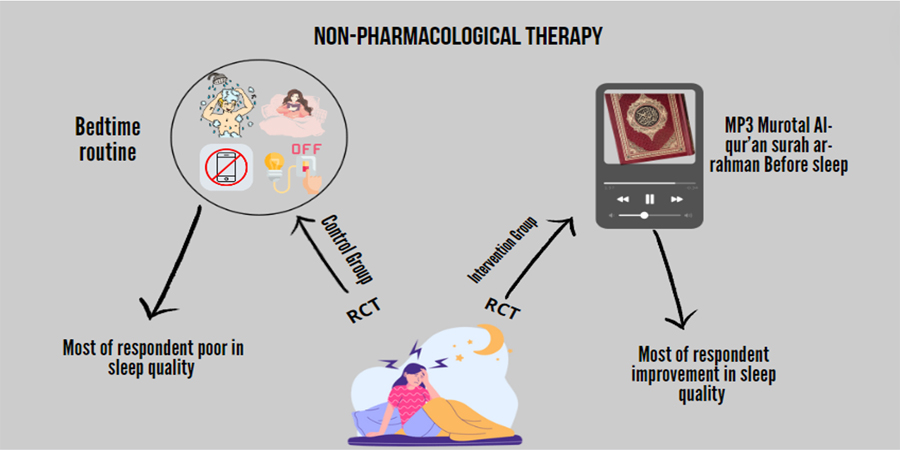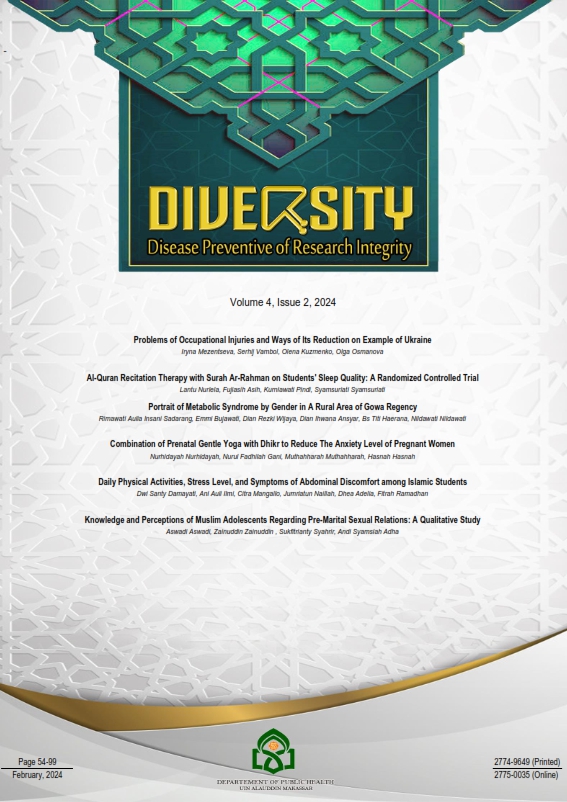Al-Quran Recitation Therapy with Surah Ar-Rahman on Students' Sleep Quality: A Randomized Controlled Trial
Abstract
Sleep quality is the level of sleep satisfaction experienced by a person which includes the components of sleep quantity, sleep continuity, and fresh and fit when waking up. Poor sleep quality is associated with psychiatric disorders, such as depression and anxiety. Recitation (Murottal) Al- Quran Surah Ar-Rahman Therapy is the chanting of the holy verses of Al-Quran Surah Ar-Rahman which is given to someone to have a relaxing effect. The research was conducted on students using the randomized control trial experimental research method with pre and post approaches with the control group. The study was conducted on 36 respondents (18 respondents in the intervention group and 18 respondents in the control group). The results showed that there was an increase in sleep quality by 13.2% in the intervention group after therapy. The mean difference in sleep quality which showed an increase in sleep quality was 0.11 greater in the intervention group than the control group, but not significant (p=0.908, α=0.05). There was an increase in sleep quality for students after being given Murottal Al Quran Surah Ar-Rahman therapy. Further research is needed with a longer treatment time and it is necessary to study the factors that most influence the sleep quality of master students.

Downloads
References
Anggraeni, D. N., Antari, I., & Arthica, R. (2023). Pengaruh Terapi Murottal Al-Qur’an Surah Ar-Rahman Terhadap Kualitas Tidur Lansia Di Upt Rumah Pelayanan Lanjut Usia Terlantar Budhi Dharma Yogyakarta. Journal of Health (JoH), 10(1), 079-085. https://doi.org/10.30590/joh.v10n1.577
Barnes, C. M., Guarana, C., Lee, J., & Kaur, E. (2023). Using wearable technology (closed loop acoustic stimulation) to improve sleep quality and work outcomes. Journal of Applied Psychology. https://doi.org/10.1037/apl0001077
Becker, S. P., Jarrett, M. A., Luebbe, A. M., Garner, A. A., Burns, G. L., & Kofler, M. J. (2018). Sleep in a large, multi-university sample of college students: sleep problem prevalence, sex differences, and mental health correlates. Sleep health, 4(2), 174-181. https://doi.org/10.1016/j.sleh.2018.01.001
Dharma, K., K., (2019). Nursing Research Methodology. Jakarta: Trans Info Media
Girdhar, R., Srivastava, V., &; Sethi, S. (2020). Managing mental health issues among elderly during COVID-19 pandemic. Journal of geriatric care and research, 7(1), 32-35.
Henrich, L. C., Antypa, N., & Van den Berg, J. F. (2021). Sleep quality in students: Associations with psychological and lifestyle factors. Current Psychology, 42(6), 4601–4608. https://doi.org/10.1007/s12144-021-01801-9
João, K. A. D. R., Jesus, S. N. de, Carmo, C., & Pinto, P. (2018). The impact of sleep quality on the mental health of a non-clinical population. Sleep Medicine, 46, 69–73. https://doi.org/10.1016/j.sleep.2018.02.010
Kannan, M. A., Ab Aziz, N. A., Ab Rani, N. S., Abdullah, M. W., Rashid, M. H. M., Shab, M. S., & Muzaimi, M. (2022). A review of the holy Quran listening and its neural correlation for its potential as a psycho-spiritual therapy. Heliyon. https://doi.org/10.1016/j.heliyon.2022.e12308
Kavurmaci, M., Dayapoğlu, N., &; Tan, M. (2020). Effect of music therapy on sleep quality. Alternative Therapies in Health and Medicine, 26(4), 22–26.
Kubiszewski, V., Fontaine, R., Rusch, E., & Hazouard, E. (2014). Association between electronic media use and sleep habits: An eight-day follow-up study. International Journal of Adolescence and Youth, 19(3), 395-407. https://doi.org/10.1080/02673843.2012.751039
Ming, X., Koransky, R., Kang, V., Buchman, S., Sarris, C. E., &; Wagner, G. C. (2011). Sleep insufficiency, sleep health problems and performance in high school students. Clinical Medicine Insights: Circulatory, Respiratory and Pulmonary Medicine, 5(1), 71–79. https://doi.org/10.4137/CCRPM.S7955
Mirza, Iskandar. (2014). Healthy With the Quran. Bandung: Salamadani.
Noviyanti, N., Rahmi, R., Dewi, R., & Nurdahliana, N. (2021). Pemberian Terapi Murattal Al-Quran terhadap Kualitas Tidur Ibu Hamil Primigravida Trimester III. Jurnal Kebidanan Malahayati, 7(2), 287-294. http://dx.doi.org/10.33024/jkm.v7i2.3970
Nurani, R. D., Rochmawati, E., &; Nurchayati, N. (2019). The effectiveness of Qur'anic murottal therapy on sleep quality in hemodialysis patients. JHeS (Journal of Health Studies), 3(2), 78–85. https://doi.org/10.31101/jhes.525
Reis, C., Pilz, L. K., Keller, L. K., Paiva, T., & Roenneberg, T. (2020). Social timing influences sleep quality in patients with sleep disorders. Sleep Medicine, 71, 8–17. https://doi.org/10.1016/j.sleep.2020.02.019
Rianti, K. I., Septadina, I. S., & Prananjaya, B. A. (2021). Holy Quran Recitation of Surah Al-Mulk and Al-Hasyr on Decreasing Anxiety In Medical Students. International Journal of Islamic and Complementary Medicine, 2(1). https://doi.org/10.55116/IJIM.V1I1.1
Riera-Sampol, A., Rodas, L., Martínez, S., Moir, H. J., & Tauler, P. (2022). Caffeine intake among undergraduate students: sex differences, sources, motivations, and associations with smoking status and self-reported sleep quality. nutrients, 14(8), 1661. https://doi.org/10.3390/nu14081661
Rosyidul'Ibad, M., & Napik, A. M. (2021). Effect of Al-Qur’an Therapy on Anxiety Cancer Patients in Aisyiah Islamic Hospital Malang, Indonesia. Jurnal Keperawatan, 12(2), 156-162. https://doi.org/10.22219/jk.v12i2.13774
Ruiz-Zaldibar, C., Gal-Iglesias, B., Azpeleta-Noriega, C., Ruiz-López, M., &; Pérez-Manchón, D. (2022). The Effect of a Sleep Intervention on Sleep Quality in Nursing Students: Study Protocol for a Randomized Kontrolled Trial. International Journal of Environmental Research and Public Health, 19(21). https://doi.org/10.3390/ijerph192113886
Sejbuk, M., Mirończuk-Chodakowska, I., & Witkowska, A. M. (2022). Sleep quality: a narrative review on nutrition, stimulants, and physical activity as important factors. Nutrients, 14(9), 1912. https://doi.org/10.3390/nu14091912
Sonang, S., Purba, A. T., &; Pardede, F. O. I. (2019). Grouping the number of population by age category by k-means method. Journal of Tekinkom (Information and Computer Engineering), 2(2), 166-172.
Sugiyono, (2017). Quantitative, qualitative and R&D research methods, Alfabeta Bandung
Sumaryani, S., &; Puspita Sari, P. I. (2015). Ar Rahman-Based Dysmenorrhea Gymnastic to Reduce Pain. Journal of Ners, 10(2), 360–365.
Supriyanti, E. (2021). Penerapan terapi murottal al-quran untuk mengatasi insomnia pada lansia. Jurnal Manajemen Asuhan Keperawatan, 5(1), 14-23. https://doi.org/10.33655/mak.v5i1.106
Tandon, A., Kaur, P., Dhir, A., & Mäntymäki, M. (2020). Sleepless due to social media? Investigating problematic sleep due to social media and social media sleep hygiene. Computers in human behavior, 113, 106487. https://doi.org/10.1016/j.chb.2020.106487
Vargas, P. A., Flores, M., & Robles, E. (2014). Sleep quality and body mass index in college students: the role of sleep disturbances. Journal of American college health: J of ACH, 62(8), 534–541. https://doi.org/10.1080/07448481.2014.933344
Vargas, P. A., Flores, M., & Robles, E. (2014). Sleep quality and body mass index in college students: the role of sleep disturbances. Journal of American college health, 62(8), 534-541. https://doi.org/10.1080/07448481.2014.933344
Wang, F., &; Bíró, É. (2021). Determinants of sleep quality in college students: A literature review. Explore, 17(2), 170–177. https://doi.org/10.1016/j.explore.2020.11.003
Zunhammer, M., Eichhammer, P., & Busch, V. (2014). Sleep quality during exam stress: the role of alcohol, caffeine and nicotine. PloS one, 9(10), e109490. https://doi.org/10.1371/journal.pone.0109490
Copyright (c) 2024 Lantu Nurlela, Fujiasih Asih, Kurniawati Pindi, Syamsuriati Syamsuriati

This work is licensed under a Creative Commons Attribution-NonCommercial-ShareAlike 4.0 International License.
Authors retain copyright and grant the journal right of first publication with the work simultaneously licensed under a Creative Commons Attribution-NonCommercial-ShareAlike 4.0 International License that allows others to share the work with an acknowledgment of the work's authorship and initial publication in this journal.
Authors are able to enter into separate, additional contractual arrangements for the non-exclusive distribution of the journal's published version of the work (e.g., post it to an institutional repository or publish it in a book), with an acknowledgment of its initial publication in this journal.
Authors are permitted to publish their work online in third parties as it can lead to wider dissemination of the work.




